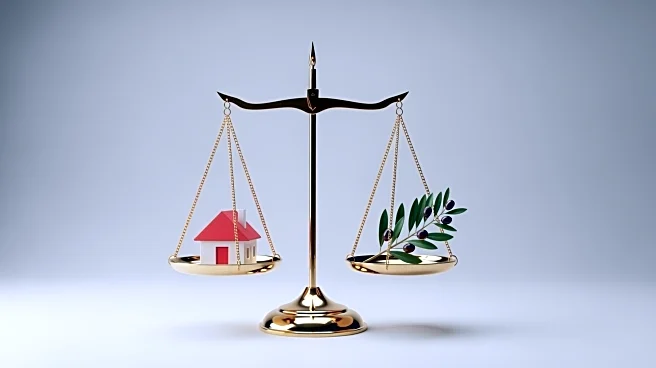What's Happening?
The International Court of Justice (ICJ) is set to deliver an advisory opinion on Israel's legal obligations to ensure humanitarian aid reaches Palestinians in Gaza and the West Bank. This follows Israel's ban
on the UN agency for Palestinian refugees, UNRWA, from operating in Gaza. The proceedings predate a U.S.-brokered ceasefire in Gaza, which allows 600 humanitarian aid trucks to enter daily. Israel has faced criticism for blocking aid and shifting distribution to a private U.S.-backed group, leading to severe food shortages. The ICJ's opinion could have broader implications for UN missions worldwide.
Why It's Important?
The ICJ's advisory opinion carries significant legal weight and could influence international perceptions of Israel's policies. The ruling may impact humanitarian aid operations in Gaza, affecting the lives of Palestinians reliant on aid. Israel's actions have drawn international criticism, with allegations of using starvation as a method of warfare. The opinion could reinforce the UN's role in ensuring aid delivery and highlight the legal obligations of states in conflict zones. The decision may also affect Israel's diplomatic relations and its standing in the international community.
What's Next?
The ICJ's advisory opinion, while nonbinding, is expected to influence ongoing discussions about humanitarian aid in Gaza. Israel's compliance with the opinion could affect future aid deliveries and its relationship with the UN. The ruling may prompt further international scrutiny of Israel's policies and actions in the Palestinian territories. The ceasefire agreement remains fragile, and any changes in aid delivery could impact the stability of the truce. The ICJ's decision may also influence other international legal proceedings related to Israel's actions in Gaza.
Beyond the Headlines
The advisory opinion highlights the ethical and legal dimensions of humanitarian aid in conflict zones. It raises questions about the responsibilities of states to ensure aid delivery and the role of international law in protecting civilian populations. The case underscores the challenges faced by UN agencies in politically sensitive regions and the importance of maintaining impartiality in aid distribution. The ICJ's opinion may set a precedent for future cases involving humanitarian aid and international law.








